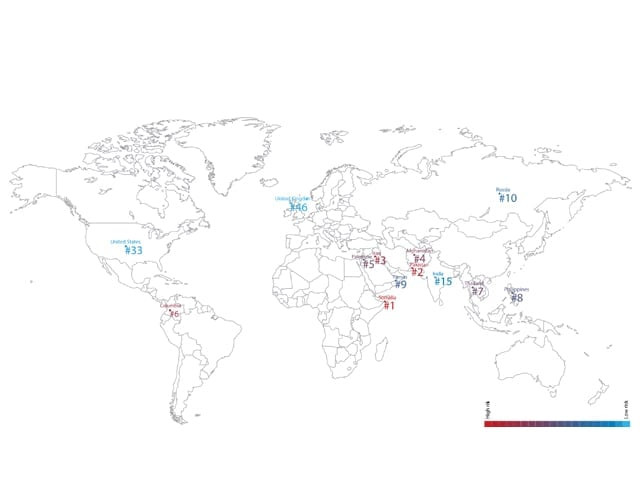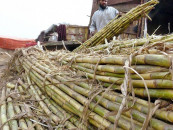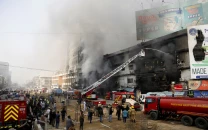In terrorism risk, Pakistan second only to Somalia
Somalia and Pakistan are ranked first and second among 16 countries at extreme risk from terrorism.

Somalia and Pakistan are ranked first and second among 16 countries at extreme risk from terrorism, according to a study published by a British global risks advisory firm.
Somalia has replaced Iraq as the state most at risk from terrorist attacks, according to global analysts Maplecroft, which sees threats also rising in Russia, Greece and Yemen but falling in India and Algeria.
Pakistan, where more than 2,000 people have been killed in a wave of deadly attacks by militants since 2007, moved up one place to become the country second most at risk, while neighbouring Afghanistan slipped from second place to fourth.
A statement by the consultancy about its latest Terrorism Risk Index said increased dangers seen in Somalia and Yemen were caused by al Qaeda-associated violence while those in Russia stemmed from attacks by separatists from the North Caucasus.
The largest change in the rankings was Greece, which moved from 57 to 24 to become the European country most at risk, a trend the consultancy said was due to violent left-wing groups.
Iraq, where sectarian carnage unleashed after the 2003 US-led invasion is receding, is now in third place.
Security experts say the global risks posed by militant groups were most recently underscored by al Qaeda’s claim of responsibility for the planting of explosives on cargo planes flying to the US from Yemen last month.
Maplecroft said Somalia suffered 556 terrorist incidents, in which 1,437 people were killed and 3,408 wounded, between June 2009 and June 2010, the period on which the rankings are based.
Yemen, across the Gulf of Aden, worries the West because it is home to al Qaeda in the Arabian Peninsula, which claimed the failed cargo plane attack and a botched plot by a Nigerian student to bomb an airliner over Detroit on Dec 25 2009.
The UK-based company’s index rates 196 countries on the number, frequency and intensity of terrorism attacks, plus the likelihood of mass casualties occurring. While based on historical data, it is intended as a forward-looking assessment.
The index’s reporting period partly overlaps with calendar 2009 data used in a previous ranking issued in February 2010.
None of the main Western economies fall within the ranking’s high or extreme risk bracket. The United States is at 33, France 44 and Britain 46, all in the medium risk category, while Canada at 67, and Germany at 70 are rated as low risk.
The index lists 16 countries as extreme risk, topped by Somalia, Pakistan, Iraq and Afghanistan and followed by the Palestinian territories in fifth place, Colombia 6, Thailand 7, the Philippines 8, Yemen 9 and Russia 10.
The company said that an increase in risk in Russia, which rose to 10 from 15, was due to a rise in big attacks by separatists from the North Caucasus including twin suicide bombings on the Moscow metro in March 2010 which killed 40 people.
Other major movers in the index included Algeria, which fell to 36 from 7, and India, which dropped to 15 from 6.
Published in The Express Tribune, November 16th, 2010.



















COMMENTS
Comments are moderated and generally will be posted if they are on-topic and not abusive.
For more information, please see our Comments FAQ